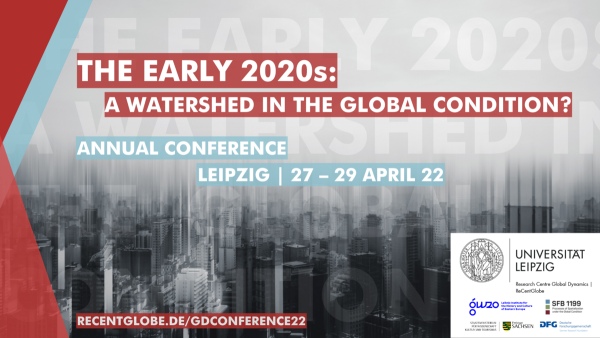|
If the newsletter does not display properly, please click here. |

|
|||||
|
|||||
|
Dear friends and colleagues, In today's Wednesday Weekly, we would like to point you to a recent publication by one of our members. We would also like to draw your attention to the annual conference of the Leipzig Research Center Global Dynamics taking place next week. Registration for this is now open. Furthermore, we would like to share a lecture series and a call for papers with you. And as a quick reminder, there will be no colloquium next week. The next one is scheduled for 4 May. Take care and have a good week! Lucy |
|||||

|
|||||
|
|||||

|
|||||
Leipzig Research Centre Global Dynamics: Annual Conference, 27–29 AprilThe registration for the annual conference of the Leipzig Research Centre Global Dynamics is now open. A pandemic lasting more than two years, the urgency of climate change, a brutal war in Eastern Europe - crises are condensing and raise the question of whether the framework for social transformations is fundamentally shifting. Has globalisation, as it has become the focus of attention since the late 1980s, come to its end? Is there a retreat from the ambitious goal of ever denser global interdependencies? Or are the global challenges becoming even more urgent and calling even more strongly than in the past for answers that must be found together internationally? But how does this reconcile with a neo-imperialism that shifts attention from biodiversity and emissions reduction to the expansion of military capacities? These are the questions that the Leipzig Research Centre Global Dynamics is addressing and will be focusing on at its upcoming annual conference from 27 to 29 April 2022. In order to find answers, historical experience will be drawn upon along with a comparative view on different world regions in which the caesura of the global framework is taking effect in very different ways. In her opening lecture, Susanna Hecht (Los Angeles) will explore the consequences that can be expected from the transformation of the Brazilian rainforest as examples of forms of collapse in and underpinning global dynamics and thus inspire the debate in a total of 15 thematic panels looking for the new global dynamics of our decade. If you have any more questions or requests please feel free to contact conference coordinator Miriam Meinekat. – Conference Programme – Wednesday, 27 April, 6:00 pm | Opening & Keynote Lecture
Thursday, 28 April, 09:00-11:00 am | Parallel Panel Slot I
Thursday, 28 April, 01:00-03:00 pm | Parallel Panel Slot II
Thursday, 28 April, 03:30-06:00 pm | Parallel Panel Slot III
Thursday, 28 April, 7:00 pm | Keynote Lecture
Friday, 29 April, 09:00-11:30 am | Parallel Panel Slot IV
|
|||||

|
|||||
Lecture Series: New Perspectives on Modernity in ChinaOur Senior Research Fellow Philip Clart pointed us to a Lecture Series on “New Perspectives on Modernity in China” from the Centre for Modern East Asian Studies at the University of Göttingen. Since the nineteenth century, China is offering perspectives on modernity that are often unexpected and therefore challenge Western assumptions about the nature of modernity. In this lecture series, we will look at Chinese history, philosophy, religion, politics etc. presenting current research that is addressing unsettling questions triggered by these developments. We would especially like to highlight two lectures: 29 April | 4 p.m. (CET) | Zoom 6 May | 4 p.m. (CET) | Zoom Please register individually for each event.
|
|||||

|
|||||
CfP: „Urbane Sozialformen des Religiösen zwischen Pluralisierung und Regulierung“ (“Urban Social Forms of the Religious between Pluralization and Regulation”)We would like to draw your attention to the call for papers for the conference "Urbane Sozialformen des Religiösen zwischen Pluralisierung und Regulierung", which is organized by the Research Center for Contemporary History in Hamburg (FZH), the Academy of World Religions at the University of Hamburg (AWR) and the Institute for the History of German Jews (IGdJ) and is scheduled to take place in Hamburg in September. The workshop will address urban social forms of the religious in recent decades from the perspectives of pluralization, glocalization, and regulation, and will serve to relate research strands that have developed in partial isolation. The focus will be on exploring the connections, interactions, and tensions that exist between the two developments and reflecting on them in terms of normative implications and challenges on the part of politics, religious communities, and society. The workshop is organized in three sections: (1) Urban Social Forms of the Religious – Individualized Practices, Interactions, (2) Urban Forms of Regulation, and (3) Dialogue, Materiality and Space. Deadline for Abstracts (300-500 words): 30 April
|
|||||
|
If you have any content that you think suits the purpose of the weekly, please feel free to send it to us at multiple-secularities@uni-leipzig.de. |
|||||
|
Kolleg-Forschungsgruppe "Multiple Secularities - Beyond the West, Beyond Modernities" Nikolaistraße 8-10, 04109 Leipzig Mail: multiple-secularities@uni-leipzig.de |
